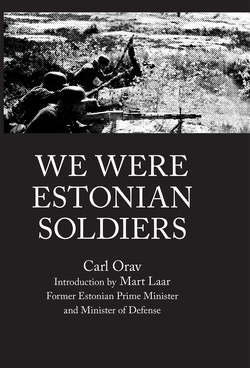Читать книгу WE WERE ESTONIAN SOLDIERS - Carl Orav - Страница 11
На сайте Литреса книга снята с продажи.
ОглавлениеChapter 2
Bits of War Memories
Hugo Kubja
Orientation map of Lt. Hugo Kubja’s war experience:
1. Military Academy, 1936 - 1940
2. Pärnu, 1940
3. Petseri, 1940
4. Irboska, 1941
5. Haystack, 1941
6. Petseri, 1941
7. Battle of Tartu, 1941
8. Leningrad front, 1942
9. Tallinn, 1943
10. Petseri, 1943
11. Escape from Saaremaa, 1944
Hugo Kubja was born on February 23, 1913, in Pala, Tartumaa, Estonia. He graduated from the Tartu Real High School and joined the army, graduating as an Ensign from the Estonian Officers Candidate School in 1933. He was accepted to the Estonian Military Technical Academy in 1936 and promoted to Second Lieutenant upon graduation in 1940.
After graduation from the Estonian Military Technical Academy, I chose the 9th Infantry Battalion at the town of Pärnu as the place to start my military career. There I was assigned to be the leader of one of the units of the 1st Company. The Academy had strongly recommended that new officers entering the service should act very humbly and conservatively and concentrate on observing the professionals. So, I tried. The activities here were very mundane and boring - marching, learning songs, and singing.
Eventually, we were required to elect political committees that were associated with the Red Army. There was to be a political recitation at a large military social event and I was assigned the task of making the preparations for it. Everything went well during the rehearsals, but we failed miserably at the main event. Right about this time, they started looking for political leaders for all the military units. Younger officers were part of this search and were interviewed for their suitability from the socialistic viewpoint. When I stated that my father had a 750 acre farm near Tartu, they found me unfit for the assignment. Likewise a schoolmate of mine, Second Lt. Linsi, also failed. The interviews for our unit soon ended since an Estonian, Major J. Ein, showed interest for this political position. Our relationship with the major immediately deteriorated. He showed his dislike for us, presumably because we were considered unfit as Communists.
One day the top brass of the division came for an inspection, but they could not find Major Ein. Non-commissioned officers were sent out to find him but failed. The battalion commander asked me to notify Major Ein of the need for his presence at a top level military meeting. That evening I took my wife to the officers’ mess for dinner and encountered Major Ein. When I notified him of the meeting, he burst out cussing and swearing at me. I couldn’t stand it and reminded him that it was inappropriate to carry on in this manner in front of other officers and their wives. My response took him off guard. He then proceeded with an apology that dragged out for some time because of his inebriated condition. I found out later that he had not forgotten this incident. He became the 9th
